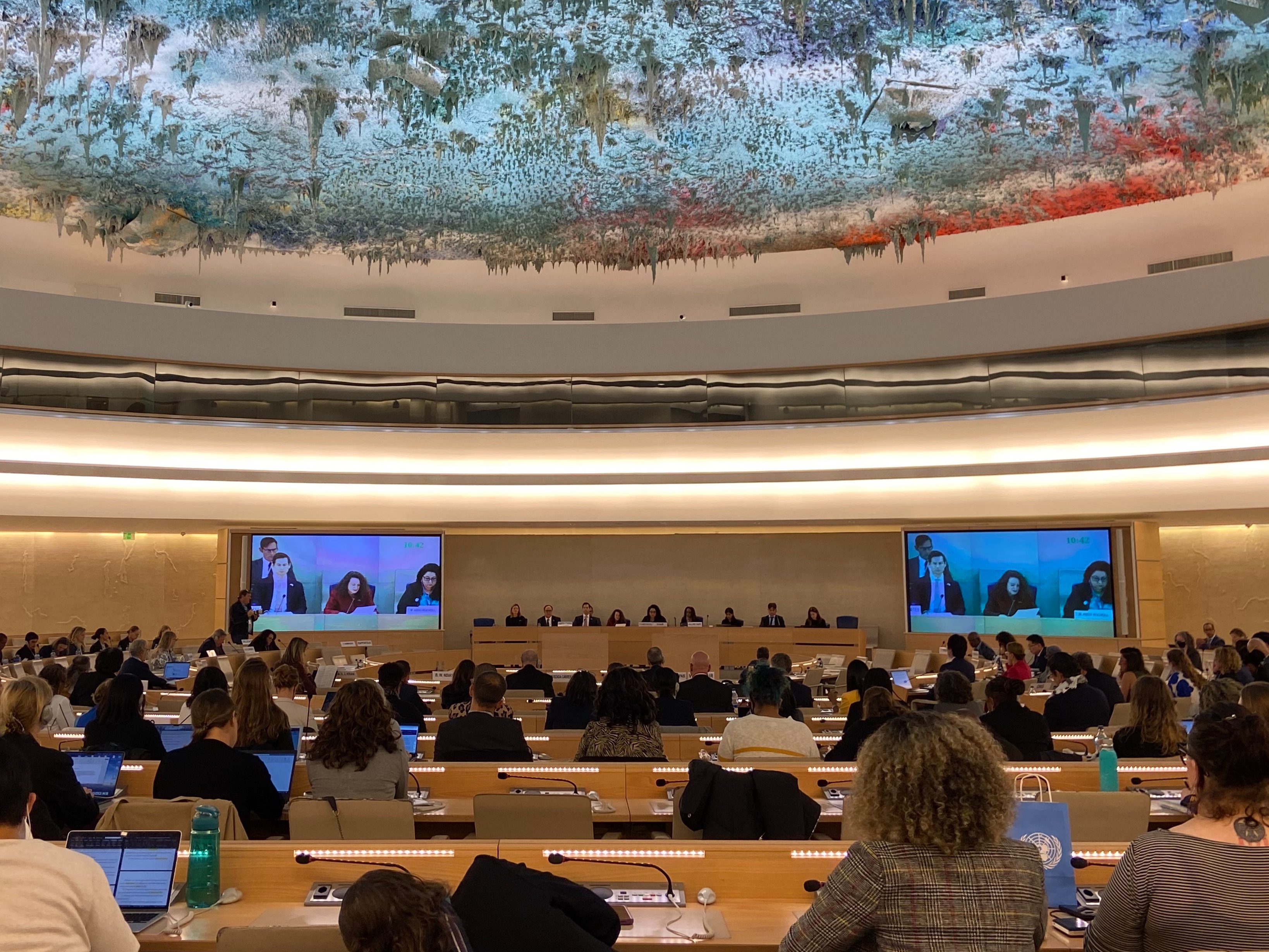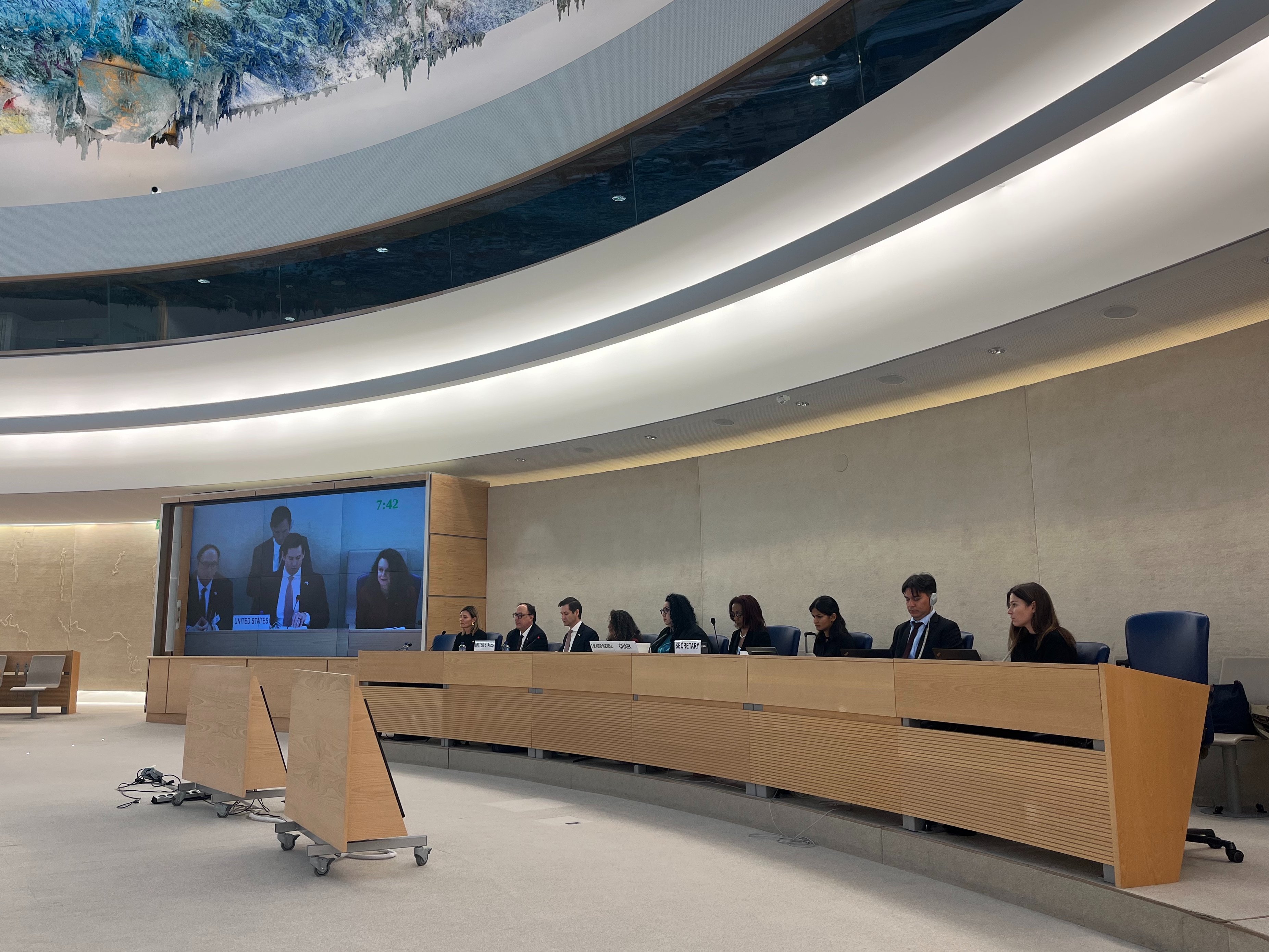United States under the microscope: vast participation of American civil society organizations at the Committee
Published on 02 Nov 2023, 05:18 PM
The Human Rights Committee reviewed the United States for the fifth time in October 2023
 US Ambassador Michèle Taylor during the dialogue with the Human Rights Committee at Palais des Nations
US Ambassador Michèle Taylor during the dialogue with the Human Rights Committee at Palais des Nations
On 17 and 18 October 2023, the Human Rights Committee reviewed the human rights record of the United States of America for the fifth time. This review was particularly intense given the extraordinarily large number of civil society representatives who came to Geneva to participate in the numerous formal and informal briefings accommodated by both the Committee members and the State delegation.
Given the high number of participants, the dialogue took place in Room XX of Palais des Nations rather than in the usual room of Palais Wilson, and the second day started with a minute of silence proposed by Committee member Ms Bassim for all the civilian victims in hospitals and schools, particularly following the developments in the Gaza strip.
The Committee raised a wide range of issues that reflected the size and complexity of the American population. Subjects varied from the need for creating a NHRI, gun violence, discrimination related to the right to housing and access to water, indigenous rights, abortion, human trafficking, LGBTQI+ rights, or transparency in campaign fundings for the presidential elections.
The dialogue was marked by the incongruences between the policies and legislation of the federal government and those of states. The extensive delegation of the United States frequently mentioned how the measures of the Biden-Harris Administration aligned with the ICCPR, but these developments were often curtailed at state-level, particularly at Republican-governed states.
Of particular relevance was the Committee’s question on whether the US intended to ratify several international human rights treaties like the International Covenant on Economic, Social and Cultural Rights. Some of such international treaties were actually co-lead and promoted by the US, such as the Convention on the Rights of the Child, but never ratified.
Racism, hate crimes and excessive use of force of the police
 Human Rights Committee Chair and members of the US delegation during the dialogue
Human Rights Committee Chair and members of the US delegation during the dialogue
One of the most prominent issues throughout the entire dialogue was the magnitude of the systemic racism in the country, particularly against Black people. It was repeatedly proved to be a cross-cutting issue among most of the topics raised by the Committee, as Black people are disproportionately affected by hate crimes, police brutality, gun and domestic violence, overrepresentation in detention facilities and death rows, and disproportionate sentences.
In this matter, the Committee asked the delegation about measures to tackle such an ubiquitous problem. Frequently mentioned was the excessive use of force by law enforcement agents, including not only during the Black Lives Matter demonstrations, but in the everyday life of Black people. The Committee also mentioned racism as the main motivation for the around 11,000 hate crime incidents recorded in 2022 in the US.
As a response, the State delegation mentioned the End Racial Profiling Act and the George Floyd Policing Act, and how the Department of Justice was encouraging Congress to act on them. As for hate crimes, the delegation acknowledged the tragic figures and stated the compromise to identify and arrest perpetrators. Moreover, public officials were receiving training on combating hate acts.
Overseas application of the ICCPR: Drone strikes and Guantanamo Bay
The extraterritorial protection of civil and political rights is enshrined in art. 2 (1) of the ICCPR, where State parties compromise to ensure the ICCPR application in territories subject to its jurisdiction. This provision is particularly relevant for the US given the de facto control it has over several regions of the world.
In this line, the Committee asked the delegation about targeted killings and the use of lethal drone strikes by the C.I.A outside recognized theaters of conflict, which led to the deaths of thousands of civilians in Somalia alone. Other questions also included the conditions of detainees at the Guantanamo Bay facility and the declassification of reports that evidence torture, which was already part of the follow-up procedure recommendations during the US previous cycle.
The delegation justified the use of targeted strikes to prevent terrorist attacks, and mentioned the US right to self-defense in the framework of the war with Al Qaeda. The delegation added that ‘no force in history is more committed to decrease the number of civilian casualties’. On Guantanamo, the delegation confirmed its intention to ultimately close the facility, though they ‘emphatically disagreed’ with the conclusions of the UN Special Rapporteur on counter-terrorism following her visit to Guantanamo. They were also considering transferring inmates to their countries of origin, though this was difficult in instances where these faced a risk of being tortured.
Extreme conditions of immigration detention and family reunifications
In the US, over 30,000 individuals are held in immigration and customs enforcement detention, most without due processes and subjected to dire conditions. In addition to this, there have been deaths of children who were under the custody of the Customs and Border Patrol. The Committee was particularly worried about the reunification of the thousands of families, given the forced separation of children from their parents during the detention proceedings.
In response, the State delegation mentioned the 2021 executive order of President Biden, which established the Task Force on the Reunification of Families for the benefit of 770 children. Steps had been taken to find alternatives to immigration detention and to improve the provision of health care services. Moreover, the very recent class action settlement in Ms L. v. I.C.E. regarding litigation on family separations was mentioned, according to which the Government committed to the prohibition of separation of families except under very limited circumstances, like medical emergencies.
Watch again the dialogue with the Committee here (part one) and here (part two).
Recommendations of the Human Rights Committee
Concluding Observations on the United States of America’s fifth periodic report were released on 3 November 2023. The State party is requested to provide, by November 2026, information on the implementation of the following recommendations:
Maternal mortality, voluntary termination of pregnancy and sexual and reproductive rights
In the light of the Committee’s general comment No. 36 (2018) on the right to life and in line with the recommendations made by the Committee on the Elimination of Racial Discrimination, 11 the State party should take all the necessary measures at the federal, state, local and territorial levels to ensure that women and girls do not have to resort to unsafe abortions that may endanger their lives and health. The State party should, in particular:
(a) Provide legal, effective, safe and confidential access to abortion for women and girls throughout its territory, without discrimination, free of violence and coercion, including through the adoption of legislative initiatives such as the Women Health’s Protection Act;
(b) Put an end to the criminalization of abortion by repealing laws that criminalize abortion, including laws that apply criminal sanctions to women and girls who undergo abortion, to health service providers who assist women and girls to undergo abortion and to persons who assist women and girls to procure an abortion, and consider harmonizing its legal and policy framework with the World Health Organization’s Abortion Care Guidelines (2022);
(c) Ensure that the professional secrecy of medical staff and patient confidentiality are observed, including by strengthening privacy protections under the Health Insurance Portability and Accountability Act, and protect women seeking abortion care from surveillance of their personal digital data for prosecution purposes;
(d) Remove existing barriers impeding access to abortion care, including inter-state travel restrictions, and refrain from introducing new barriers;
(e) Continue its efforts to guarantee and expand access to medication abortion.
Freedom of assembly
In the light of the Committee’s general comment No. 37 (2020) on the right of peaceful assembly, the State party should:
(a) Effectively guarantee and protect the right of peaceful assembly and ensure that any restrictions, including administrative and criminal sanctions against individuals exercising that right, comply with the strict requirements of article 21 of the Covenant;
(b) Ensure that all allegations of excessive use of force, arbitrary arrest and detention in the context of peaceful assemblies are investigated promptly, thoroughly and impartially, that those responsible are brought to justice and if found guilty, punished with appropriate sanctions, and that victims obtain full reparation;
(c) Provide appropriate training to law enforcement officials on the right of peaceful assembly, the Basic Principles on the Use of Force and Firearms by Law Enforcement Officials and the United Nations Human Rights Guidance on Less-Lethal Weapons in Law Enforcement.
Voting rights
Recalling its previous recommendations, the State party should:
- (a) Take all necessary measures to ensure that all persons entitled to vote are able to exercise that right, including by eliminating excessive burdens on voters that could result in de facto disenfranchisement, and ensuring that polling stations are accessible, particularly in states with weak election infrastructure and for persons with restricted accessibility;
- (b) Fully restore the Voting Rights Act and increase funding and other resources for federal agencies to enforce federal voting rights legislation, and enact additional legislation to reinforce the voting rights of its population, such as the pending John R. Lewis Voting Rights Advancement Act and the Freedom to Vote Act;
- (c) Ensure that electoral districts are drawn by non-partisan commissions who are subject to checks and balances and that they do not have the purpose or the effect of denying or abridging the right to vote based on racially discriminatory grounds;
- (d) Conduct thorough and effective investigation on the harassment and attacks against election officials, ensure perpetrators are prosecuted, and if convicted, punished with appropriate sanctions;
- (e) Redouble its efforts to ensure that all states reinstate voting rights to felons who have fully served their sentences or are on parole; provide inmates with information about their voting restoration options; remove lengthy and cumbersome voting restoration procedures; and review automatic denial of the right of imprisoned felons to vote;
- (f) Ensure that rules governing campaign funding guarantee an equal right to take part in the conduct of public affairs and ensure the free choice of voters, including by enacting additional legislation on campaign expenditure such as the Democracy is Strengthened by Casting Light on Spending in Elections (DISCLOSE) Act.
Here you can find all the recommendations given by the Committee in the Concluding Observations.
The follow-up report of United States of America on the implementation of the recommendations is due in 2026. The next list of issues will be adopted in 2029, and the next periodic report is due in 2030.
 US Ambassador Michèle Taylor during the dialogue with the Human Rights Committee at Palais des Nations
US Ambassador Michèle Taylor during the dialogue with the Human Rights Committee at Palais des Nations


